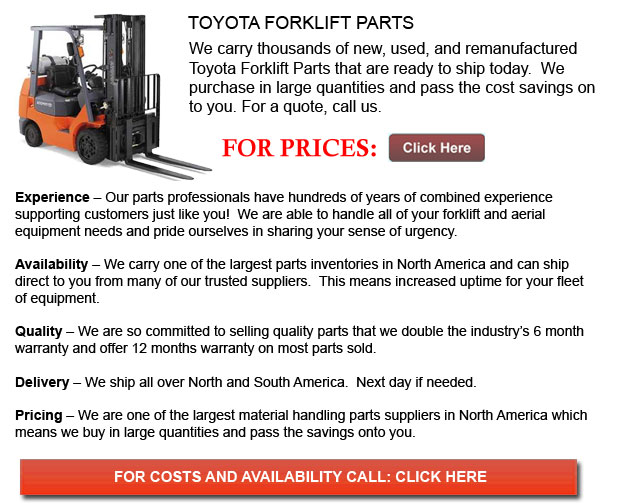
Toyota Forklift Parts - In the U.S., Toyota Materials Handling inc., or TMHU, has been the best selling lift truck provider since 1992. This company has been based out of Irvine, California for well over 40 years, providing a complete line of quality lift trucks. With a great reputation of durability and reliability, Toyota lift trucks have thrived in the competitive resources handling market. Quality is the keystone of Toyota's renowned Toyota Production System practiced at all manufacturing facilities, including TIEM, which is stands for Toyota Industrial Equipment Manufacturing, situated in Columbus, Indiana. The majority of the Toyota lift trucks sold in the U.S. are built here.
All Toyota machinery and parts designed within North America adhere to the International Organization for Standardization or ISO 14001 standard. TIEM has been honored many times for its commitment to persistent improvement, and its environmental methods. It is the first and only manufacturer to offer EPA and CARB-certified Compressed Natural Gas powered lift trucks on the market. To illustrate, the Toyota 8-Series IC lift trucks emit 70 percent less smog forming emissions than the current federal EPA standards and have complied with California's strict emission standards and policies.
TMHU, U.S.A.- Leading the Industry
Brett Wood, President of TMHU, associates Toyota's success to its strong commitment to manufacture the finest quality lift vehicles at the same time as delivering the utmost customer service and assistance. "We must be able to learn and predict the needs of our customers," said Brett Wood. "As a leader, our success also depends on our ability to address our customers' operational, safety and environmental cost issues." TMHU's parent company, Toyota Industries Corporation, also referred to as TICO, is listed in Fortune Magazine as the world's principal lift truck dealer and is among the magazines prominent World's Most Admired Companies.
New Meaning to Environmental Accountability
Toyota's parent company, Toyota Industries Corporation, has imparted an outstanding company principles towards environmental stewardship within Toyota. Toyota's rich history of environmental protection whilst retaining economic viability can not be matched by other organizations and certainly no other resource handling maker can thus far rival Toyota. Environmental responsibility is an important characteristic of company decision making at Toyota and they are proud to be the first and only manufacturer to offer UL-listed, EPA- and CARB-certified Compressed Natural Gas powered lift trucks. Yet an added reason they remain a leader within the industry.
Toyota first launched the 8-Series line of lift trucks in 2006, again exhibiting its leadership and innovation in the industry. Featuring an exclusive emission system that eclipsed both Federal EPA emission principles, and California's more environmentally friendly emission standards. The end creation is a lift truck that produces 70% fewer smog forming emissions than the current Federal standards allow.
Moreover in 2006, Toyota developed an affiliation with the Arbor Day Foundation, furthering their commitment to the environment. In excess of 57,000 trees have been planted in community parks and national forests damaged by ecological reasons such as fires, as a product of this partnership. 10,500 seedlings have also been spread through Toyota Industrial Equipment's system of sellers to non-profit organizations and local customers to help sustain communities all over the United States
Toyota's lift trucks offer improved durability, visibility, output, ergonomics, and all the foremost safety technology that has made Toyota an industry leader. The company's System of Active Stability, also referred to as "SAS", helps limit the possibility of mishaps and injuries, and increasing productivity levels while minimizing the potential for product and equipment damage.
System Active Stability is able to discern conditions that may lead to lateral volatility and possible lateral overturn. When one of these factors have been detected, the SAS will instantly engage the Swing Lock Cylinder to re-stabilize the rear axle. This alters the lift truck's stability trajectory from triangular in shape to rectangular, providing a major increase in stability which substantially reduces the likelihood of a mishap from a lateral overturn. The Active Mast Function Controller or the Active Control Rear Stabilizer also aids to avoid injuries or accidents while adding stability.
The SAS systems were initially used on the 7-Series internal combustion lift trucks which were put on the market in 1999. These systems helped push Toyota into the lead for industry safety standards. Now, SAS is adopted on nearly every new internal combustion products and is standard equipment for the new 8-Series. There are more than 100,000 SAS-equipped lift vehicles in action, exceeding 450 million hours combined. The increased population of SAS-equipped vehicles in the field, along with compulsory worker training, overturn fatalities across all designs have decreased by 13.6% since 1999. Furthermore, there has been an overall 35.5% decrease in industry wide collisions, loss of control, falls and overturn from a lift truck for the same period.
Toyota's hardnosed standards extend far beyond the machinery itself. The company believes in providing general Operator Safety Training programs to help clients satisfy and exceed OSHA standard 1910.178. Education packages, video tutorials and a variety of resources, covering a wide scope of topics-from individual safety, to OSHA rules, to surface and cargo situations, are available through the seller network.
Toyota has maintained a continuous existence in the United States ever since its first sale. In 2009, Toyota Industrial Equipment Manufacturing, produced its 350,000th lift truck. This fact is demonstrated by the statistic that 99% of Toyota lift trucks sold in America at the moment are built in the United States.
Situated in Columbus, Ind., the Toyota Industrial Equipment Mfg. campus equals 998,000 square feet of facilities spanning 126 acres. Facilities include a National Customer Center, as well as production operations and supply centers for equipment and service components, with the whole commitment exceeding $113 million dollars.
The new National Customer Center was conceived to serve both sellers and customers of TMHU. The facility includes a 360-degree display room, a presentation theater complete with stadium seating for 32, an area for live merchandise demonstrations with seating capacity for 120; a presentation theater; Toyota's Hall of Fame showcasing Toyota's history since the birth of its originator, Sakichi Toyoda, in 1867, and lastly a education center.
TMHU has 68 sanctioned industrial equipment dealers, along with 189 dealership locations throughout the United States, offering the most complete and inclusive customer support and customer service in the industry. The company's new and Licensed Used lift vehicles, service, parts, and financing capabilities make Toyota dealerships a one-stop shop to guarantee total customer satisfaction.
![]() Click to Download the pdf
Click to Download the pdf
Forklift Parts
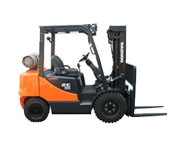
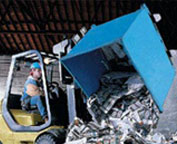
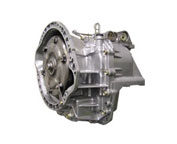
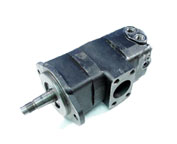
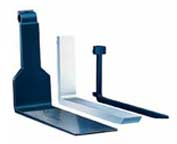
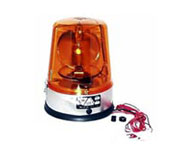
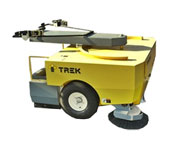
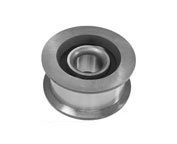
Lift Parts Express
TOLL FREE: 1-888-695-7994
Albany, New York
forkliftpartsalbany.com
Email Us
About Us


